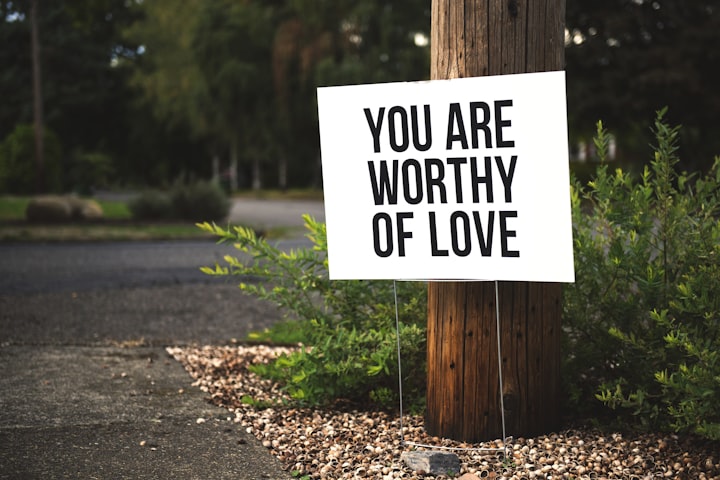Is This Reasonable? This Stopped Me Killing Myself.
I was suicidal when I heard these words first.

March 2020. Covid had just hit Ireland and it was announced we would be going into lockdown (our first of many as it turns out). I had just managed to make an appointment with the local Pieta House (a suicidal prevention and mental health support centre). I was probably one of the last people they had in face to face. From then on my counsellor (Amanda) would contact me through bi-weekly phone calls. I should explain that I was not suicidal and depressed because of Covid. It didn't help but rather my low state was due to my situation in life.
Officially, according to the Department of Social Protection (welfare), I have been unemployed for 9 years. I had jumped through all the hoops, done all the job groups, all the "job activation schemes" (Jobs Bridge, Jobs Path, Intereo). For 7 months I wasn't even in the country because I was looking for work in America. For a year I was technically back in college retraining. I was being reminded I was unemployed by the dole office. I was being reminded by family. I was being reminded by my girlfriend. Shockingly, I don't need reminding what's going on in my life. The negative voice in my head, the part of me made by being reminded so much, was ensuring that.
I was 30, unemployed, living off just €203 a week, and I was being told to get a job in the middle of a global pandemic. To say Amanda came into my life at an opportune time would be an understatement. I was weighing my options for suicide, working out the logistics of it. Where? When? With what? Was there some way to do it painlessly? Was there somewhere private I could do it where my girlfriend wouldn't find me?
During our sessions, I talked about how I just felt overwhelmed, like I was struggling to keep everyone happy, being pulled in a thousand different directions. I felt like I couldn't air my problems or that I was being too sensitive. I had mood swings, a short temper, bouts of depression and crying. I wanted to die. I felt like a failure. I felt like people disliked me. I felt ashamed. I felt -
"Ask yourself; is this reasonable?"
…Excuse me?
Amanda went on to explain that in a moment in my life when someone is angry with me, or if I'm lashing out at someone, or if I'm depressed or emotional about something said or done, I should stop and ask myself "Is this reasonable?"
I could never have imagined how many ways this simple question would improve my life.
WHAT DOES IT MEAN?
It seems insultingly simple, doesn't it? Of course you should be reasonable and expect people to be reasonable. But really think for a second what asking that question entails.
For something to be "reasonable", it needs to be an expectation you can apply to yourself, others, and others would apply to themselves and you, within your abilities. Expecting people to do things you'd never or can't do is unreasonable. There also needs to be evidence that the expectation is possible. Asking for help with a problem is reasonable. Asking for help with a specialised problem many people wouldn't know about is unreasonable.
In the moment it's easy to get swept up in your emotions, to take things personally and to assume what people mean. A harmless joke suddenly becomes the catalyst for an argument. An unwarranted insult is submissively accepted as a fact about yourself. An defeatist belief becomes just an everyday motif in your life.
"Is This Reasonable" straight away challenges those beliefs, opening the possibility that maybe there's more than meets the eye. And if there's a possibility, you consider it, taking yourself out of the emotional, instinctual reaction state and into a detached, analytical state. Just by asking the question, you suddenly gain a new insight, a third party point of view.
Is it reasonable to get angry about a joke? No. Laughing at the joke is.
Is it reasonable to let an insult slide? No. Standing up for yourself is.
Is it reasonable to beat yourself up? No. Working on yourself is.
GASLIGHTING AND DISTANCE.
Imagine your life is a 90's sitcom, filmed in front of a live studio audience. Imagine your audience watching your life. A tv show with a character who acts irrationally and irresponsibly, will have the audience not liking them, thinking they're acting out of character, or let them see the ways things could have gone right. The question of being reasonable works the same way, except it lets you sit in the audience, watching yourself, ensuring you don't act out of character or in a way that would make you hate yourself.
Now imagine the Newman of your sitcom comes in; the person or thing who just gets you rattled up, gets you doubting yourself, your senses, and your memories. The same method can be applied here, to combat gaslighting, which depends on being unreasonable and overbearing, provoking an immediate, emotional reaction.
It allows you to not only gain distance between yourself and the heated scene in progress, it also allows you to cut through the bull and see how people really act and why. A person who isn't coming with good intentions will not act reasonable. They'll make big demands, blame you, claim to be the victim but be aggressive. In the moment, you can't help by try to catch and defend yourself against this onslaught. It even seems easier to just take it and agree. "Is this reasonable?" grounds you in the moment but it suddenly builds your confidence that you are not as bad as the person you're against is trying to make you out to be.
I had to go to counselling about five years ago after a very messy and bad break up. It took about a month of weekly sessions to realise I was in a textbook example of an emotionally and mentally abusive relationship. My partner often lost her temper, accused me of cheating (she actually cheated on me twice), criticised me, broke up with me only to demand me back, called me her boyfriend to some of her friends but not around other ones. Had I known then what I know now, armed with the reassurance that, yes, this was unreasonable behaviour, at the very least I would have been able to recognise and leave a toxic relationship sooner.
INTROSPECTION.
While it is a good mantra to recognise inconsistencies in others, its true strength comes from recognising your own inconsistencies. There are times to get mad, sad, defensive, and let things slide. The problem isn't that we have emotions. The problem is we don't know when to use them.
I've heard it said that the average stone age human was nowhere near as continually stressed as the average modern human is. While we are in far safer times for humanity, we are in a state of constant worry, anxiety, and fear. Mentally we haven't evolved much since our past, where people were stressed about predators, the forces of nature, and other tribes.
But animals sleep. Nature can be tamed and endured. Tribes can become allies. Mentally, we are built for intense bursts of stress that demand our immediate reaction followed by periods of calm. We are not, however, built to constantly see threats in the news, in each other, and in ourselves.
We see these threats, but only because our brains are built to see threats, to identify them. We are living in a civilised world with savage brains.
Asking ourselves is something reasonable not only reminds us that we are living in one of the safest times in human history, but it forces us to ask tough questions about what we believe and why.
When I was growing up, my sister was a little rebellious. As a child, when you see an older sibling getting in trouble and being punished, it's natural to think you need to stay as far away from that as possible to avoid the same fate. So, I became a suck-up. I did the dishes, I was polite, studied hard, I helped whenever. I would run whenever someone called me, ready to do whatever they asked. I connected security in my family with proving myself to others.
I know now, in my thirties, that while I love my family, there are worse fate than losing them. If I had been punished or thrown out for something small, asking myself "is this reasonable" would have helped me realise that any family that throws out their own child is not reasonable. My parents reaction to my sister's behaviour was reasonable, not a threat to myself and my safety.
I don't need to prove myself to others for their love. That is not reasonable.
---
When I was first being accessed by Pieta House, I was asked another deceptively simple question;
Do you love yourself?
Again, deceptively simple. Again, almost insulting easy on the surface. But as I broke down crying, unable to even say I didn't hate myself, I realised that I had major problems. On the suicide ideations scale (1 being no desire, 10 being I'm doing it today) I was a 7; like I said, I was starting to consider options.
Suicide, I've heard it said, is a permanent solution to a temporary problem. I agree to a degree. It's more like I wanted a pause button. I wished I could stop time, take a hour or two to lie on the floor crying, gather my thoughts, and then have all the answers. "Is this reasonable" is the next best thing.
It allows me to see my problems from a distance, to see how I'm behaving to the scenario and adjust accordingly. But most importantly, it lets me value myself. It reminds myself that as someone alive I have the right to hold myself and others to a reasonable standard. I owe others the respect to not lash out at them, while at the same time I owe it to myself to expect respect from others.
It's now June 2021. The country is opening back up again. At some point this Summer I'll be able to see my family for the first time in almost a year. And I've been able to apply this mantra for a year. And while I have slipped at times, I can say I am in a great place in my life.
I'm still unemployed but I don't beat myself up about it. I will get work. I am in an amazing relationship. I help people not for their approval but because I want to help. I'm working on projects I want to work on and have some exciting things in store. I'm happy where I am and I can say now I love myself. I still deal with bouts of depression but approach them with optimism, knowing they will pass eventually. The future is looking bright and I'm looking forward to it. Is this reasonable?
Yes.
About the Creator
Conor Matthews
Writer. Opinions are my own. https://ko-fi.com/conormatthews






Comments
There are no comments for this story
Be the first to respond and start the conversation.